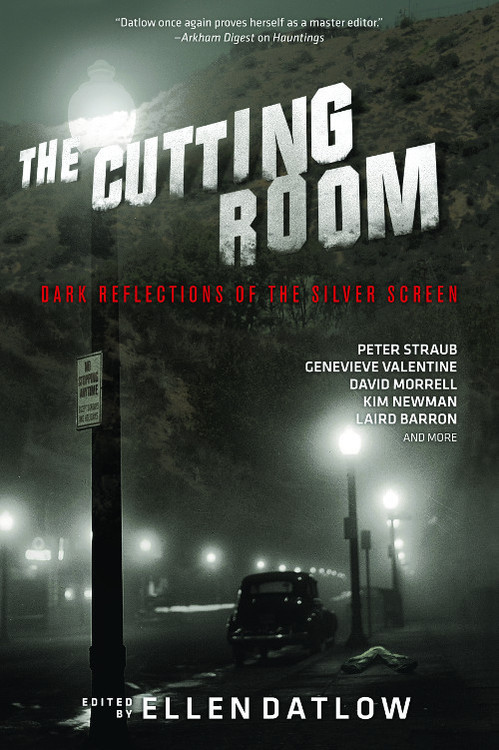THE CUTTING ROOM coming attraction: “Even the Pawn” by Joel Lane

Over the next two weeks, in celebration of Halloween and the new anthology The Cutting Room: Dark Reflections of the Silver Screen, Tachyon and editor Ellen Datlow present excerpts from a selection of the volume’s horrifying tales.
Today’s selection comes from “Even the Pawn” by Joel Lane.
Early on a February morning in the city centre, two refuse collectors found a human body wrapped in double-strength bin liners. It had been dumped in one of the tall bins at the back of a Chinese restaurant, with no serious attempt at concealment. As if whoever put it there had wanted it to be found. The refuse collectors had chased a few crows away from the bin, and immediately seen what they had attacked. Before the rush hour, the body was in the city morgue next to the law courts.
Fortunately, the crows hadn’t reached her face. Though what identification we managed was of limited value. She was aged eighteen or so, white, possibly Slavic. Her hair was cut short, spiked and bleached. She had complex injuries, external and internal, that pointed to sustained beating and sexual abuse. What made headlines was that she’d died after being left in the bin, though probably without regaining consciousness.
The photo that appeared in the papers showed her face after the mortician had toned down the bruising. It was a strong face with dark-blue eyes and good teeth, a few loose. She was somewhat overweight. When dumped, the body had been wearing a T-shirt and shorts that were too small for her, probably not hers. We failed to match her face, teeth, and DNA with anyone on record.
In the week following local press coverage of the death, we received three anonymous phone calls from men who claimed to know the dead girl. All of them said her name was Tania, and she’d worked in a massage parlour in the city. Two of them named a place in Small Heath, one a place in Yardley. Both parlours were owned by the Forrester brothers, two local businessmen whose affairs we weren’t likely to be investigating soon. They had important friends in the force and the local council—by “friends” I mean people they owned. There are other kinds of friends, though it seemed that Tania hadn’t had any kind.
The hostesses at both parlours told us the same thing: Tania had been sacked because she was unreliable. A colleague some distance up the food chain from myself had a word with the Forrester brothers, who claimed no knowledge of what had happened to her. We’d already established by default that Tania—which almost certainly was not her real name—had been trafficked from Eastern Europe, but since the Forresters were above reproach we had little to go on.
My involvement in the case started with something the hostess at the Kittens parlour in Yardley had said. There was a “regular” at Kittens who always phoned to ask if Tania was there. If she was busy when he arrived, he waited for her. Since most of the punters chose other girls, this fanboy had made quite a difference to Tania’s confidence. Since her departure—the hostess claimed to be unsure whether the dead girl was really Tania—he hadn’t been back.
Yardley being part of my regular patch, I was asked to monitor Kittens and try to track down this possible stalker of the dead girl. It was one of several parlours near the Swan Centre, a convenient stopping-point for sales reps and long-distance drivers. The hostess—“receptionist” was her official job title—was a tired-looking woman in her forties called Martina. She promised to call me on my mobile if Tania’s former admirer turned up.
Before I left, Martina showed me the waiting area, where two girls were watching TV and drinking coffee. They were both wearing blue cat masks. I didn’t stay, but the image bothered me for days afterwards. At least the sins you commit in your heart don’t expose you to blackmail.
The call came a few weeks later, but not from Martina. The man on the phone said he sometimes visited Kittens, and had been friendly with Tania. He hadn’t been there in a while. Today, when he’d turned up, Martina had warned him the police were after him. “I thought I’d better contact you myself.”
We interviewed the punter, whose name was Derek, for two three-hour sessions. He was aged nearly forty and lived alone. It soon emerged that he was an alcoholic. The interviews were very dull. He wanted to talk to us about Tania and his distress at her death. But he seemed to know nothing that could help us. The weekend of her death he’d been in Stafford, helping his parents move house. We checked the alibi and it held. He was harmless, ignorant, and about as interesting to listen to as woodlice in the loft.
“We were close,” he said more than once. “Tania liked me, I could tell. The way she reacted when I touched her. Sometimes I’d make her cum. Sometimes we’d make love fast, then just sit together and talk until the time ran out. We didn’t meet up outside the parlour, but we would have eventually. I could tell she didn’t have a lover. Sometimes I know things without being told them.”
For information on The Cutting Room: Dark Reflections of the Silver Screen, visit the Tachyon page.
Cover by Josh Beatman.
